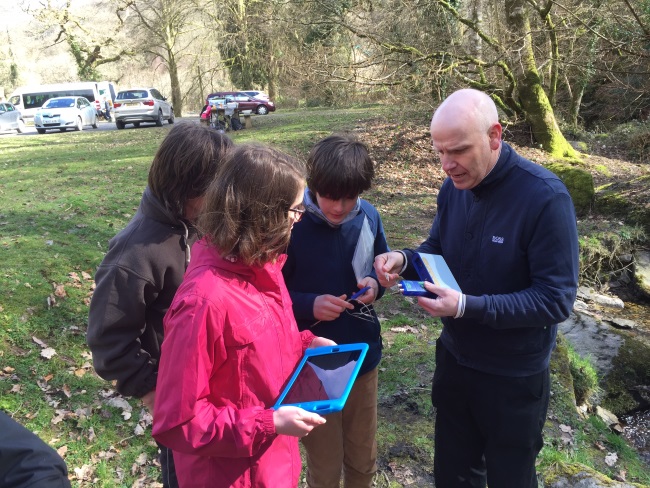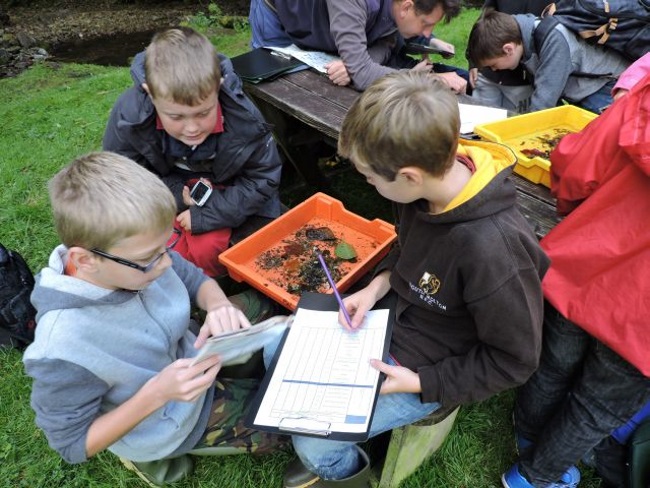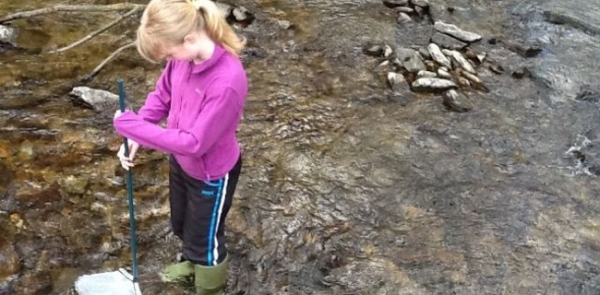Our students teamed up with Dave Gurnett, a ranger from the Exmoor National Park, to run tests on the East Lyn River. They began with some standard river profile measurements (cross-section, wetted perimeter, water velocity, bed load etc), and followed with an examination of land use in the valley and surrounding area, noting the influence on water quality operated by agricultural practices, moorland conservation measures, and tourist visitors in this part of the National Park.

The students then worked in small teams to complete a biological assessment by running kick samples on stretches of the river to examine insect life as indicators of the health of the water. Macroinvertebrates (animals without backbones that are large enough to be seen without the aid of a microscope) are valuable indicators of the health of rivers in part because they are benthic, meaning they are typically found on the river bed and do not move over large distances. Therefore, they cannot easily or quickly migrate away from pollution or environmental stress.
Because different species of macroinvertebrates react differently to environmental stressors like pollution, sediment loading and habitat changes, quantifying the diversity and density of different macroinvertebrates at a given site can create a picture of the environmental conditions and health of the river. Species intolerant to environmental stress (eg mayflies, stoneflies and caddisflies) disappear, while tolerant species (eg leeches and tubifex worms) will be the only survivors in a dirty river. Students were also able to make use of their iPads to operate a Passport AirLink 2 measuring instrument donated by Pasco, an electronics company, who have given their support to the project. Sensitive probes and sensors, combined with the SPARKvue app, allowed accurate measurement of water temperature, acidity, conductivity and dissolved oxygen levels.

It was difficult deciding which students should be chosen to take part in this project, so we tried a completely different approach, forming a study group comprising a number of high attaining Geography students along with selected Pupil Premium students and a number of students with special educational needs. This blend proved to be tremendously successful, allowing the gifted students to delve deep into new aspects of the topic - a particular interest being shown in the Exmoor Mires Project, where we were shown how management and restoration of peat bogs in the catchment area of the river helped to improve overall water quality. They also adopted mentoring roles to support the other students in the group, who rose magnificently to the challenges of the data collection and presentation tasks set before them.
After returning to school, students began to write up their findings using iBook Author software, which they had not previously used. Their efforts will later be merged with work prepared by students in the other schools to produce a shared e-book, which will eventually be published and sold to raise funds to support future projects. Neil's dream is to restore and equip a boat to travel the rivers of Ecuador and visit local schools to deliver his iPad lessons, and I hope that we will have the opportunity to continue to be part of this exciting venture.
Have you undertaken a similar project? Share your experiences here!


















